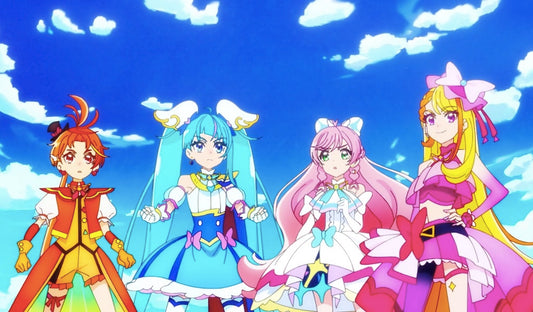
The main gimmick of Delicious Party Precure is right in the name: the joy of food. Heroines and their mascots are designed based on rice, bread, and noodles. Villains rob the flavor from dishes by stealing away the spirits that give dishes their brilliance. But more than just an aesthetic flourish, I think this focus on encouraging viewers to eat well might actually be reflective of a more general goal of teaching love and acceptance of both self and others through its positive portrayals of eating and its nonstandard depictions of gender.
Eat Well for Your Own Sake

This is not the first time a Precure has put the spotlight on culinary traditions, but with older titles like Kira Kira Precure a la Mode, the focus is on snacks and desserts. Given the new emphasis on staple grains in Delicious Party, I suspect that the goal is to encourage more well-rounded and nutritious eating habits. Crucially, however, characters are not being encouraged to diet or deprive themselves of good food—it’s not about “looking right” or changing yourself for others, but being happy with oneself. One potential issue is that the character designs are still lacking in body-type diversity, and I think it’ll be a great while longer before that changes.
Acceptance of Gender Nonconformity

A less visible but still noteworthy addition that Delicious Party brings to Precure is the introduction of the character Rosemary, aka Mari. Rosemary hails from the CooKingdom and acts as the mentor for the fledgling Precures, and their design is decidedly gender-nonconforming. Their physical build is more traditionally masculine while their language and aesthetic style are more traditionally feminine, and the other characters crucially refer to them as “Mari-chan” as if to naturally respect how Rosemary presents themselves.
Rosemary as Role Model
The series does not give specific pronouns for Rosemary, so it’s not clear if the character might be trans, nonbinary, or non-cisgender in some other way. Due to aspects of the Japanese language, they can pretty much avoid it entirely if they so choose. While this can feel like the series is playing things overly safe, the very fact that a Precure is willing to have a character like this so prominently while also portraying them as a strong and kind role model says to me that the creators of Delicious Party want those who see themselves (or those they know) in Rosemary to understand that there’s nothing wrong with those who don’t conform to gender standards.
Subtle Progress
From the very start, Precure has subtly challenged societal norms when it comes to what is expected of girls. Delicious Party Precure continues this trend. While the new series and the franchise as a whole have a long way to go, I’m looking forward to further positive surprises.
You might be interested in reading this as well.
-
TROPICAL ROUGE! PRECURE EARLY THOUGHTS
-
HOW THE PRECURE AGE EXPERIMENT SET THE STAGE FOR YURI IN KIRA KIRA PRECURE A LA MODE







